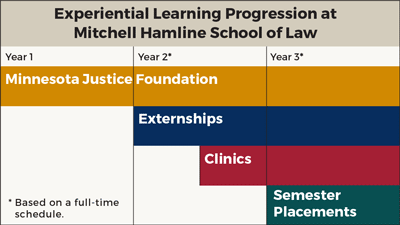Practical, problem-solving, and hands-on
At Mitchell Hamline, experiential learning is not a department, it’s who we are. Attachment to practice is in our DNA, and we are committed to offering students the maximum possible opportunity to do what real lawyers do while still in law school.
We teach the law in context, and we pair content with skills from the start. For example, our version of the first-year required criminal law class is called Criminal Law: Statutory Interpretation. We view problem-solving as not just a way to resolve conflicts but as an overarching approach that extends to advocacy, contracts, and transactions.
We have a history of pioneering opportunities for students to practice legal skills. Our students were among the first in the nation to represent real clients through a partnership with a local charity in 1922. A dozen years later, we became the only U.S. law school to offer a four-year course in court practice. Then came a seminar on legal writing and legal drafting in the late 1950s.
The foundation of the school’s current experiential education program came in 1973, with the creation of one of the nation’s first clinical programs.
Experiential learning progression at Mitchell Hamline
At Mitchell Hamline, students get pro bono experience starting in their first year through the Minnesota Justice Foundation and are eligible in later years for more than a dozen clinics as well as externship and semester placements in more than three dozen legal settings. They participate in moot courts and competitions. Throughout the curriculum, simulations are used to give students practice resolving situations they’ll face in the real world, and they get real-time feedback from professors as well as practitioners in the field.
Experiential Learning Programs
-
The Legal Practice Center
The Legal Practice Center functions as a law office within the law school. Students represent low-income renters, prisoners, nonprofit groups, immigrants, and others. They assist parents in child protection cases, draft contracts, and file patent applications.
-
Advocacy
Advocacy refers to the act of arguing in support of a client. At Mitchell Hamline, we train students to tell clients’ stories in ways that matter in the current legal system. Education in the skills of advocacy pervades the Mitchell Hamline curriculum. Those skills are at the core of the three primary relationships involved in the practice of law: with clients, with opposing lawyers, and with decision makers.
-
Clinical Program
Under the supervision of professors, students work in 17 clinics with clients who are mothers, fathers, immigrants, leaders of nonprofit organizations, and small businesses. Some clients are elderly. Some are unemployed. Some are accused of crimes. Some want to make the world a better place. All are real people with real legal problems, and our students drive their representation. They gain valuable real-world experience and make a difference in our community by performing legal work for their clients.
-
Externships
Students work across a range of practice areas and legal settings. They work with public defenders to preserve the rights of the accused, with state and county agencies to shape public policy and protect society’s most vulnerable, with federal judges to ensure the judicial system is just, and with numerous other partners. Students in externships are supervised both by Mitchell Hamline faculty and by attorneys and judges in the field.
-
Legal Writing
Mitchell Hamline’s Legal Writing program is a foundational offering, required for all first-year students, intended to master fundamental client representations skills. Students meet in small groups to practice interviewing and counseling clients, writing memos and letters, researching the law, negotiating contracts and settlements, reasoning about a client’s situation in light of the law, settling cases, and arguing motions.
-
Semester Placements
At Mitchell Hamline, we offer a variety of opportunities for students in their third or fourth years to secure long-term, on-site placements working under the supervision of practicing attorneys. It’s a key part of our bridge-to-practice programming, offering experienced students a close-up look at the world of legal work.
-
Simulation Courses
Our legal practicum and advanced simulation courses immerse students in the areas of general practice and advocacy through innovative hands-on learning exercises pioneered by Mitchell Hamline faculty and staff.
-
Transactional Law
Lawyers need to know how to argue cases in court, but they also need the skills to negotiate terms, draft contracts and settlements, structure agreements, analyze deals, and manage risk.
You’ll find these skills woven throughout our curriculum across a range of courses involving contracts, advocacy, and ethical issues arising in a variety of contexts.
-
Minnesota Justice Foundation
The Minnesota Justice Foundation (MJF) is committed to promoting social justice and improving legal services for those who have been under-represented by the legal profession. Through MJF, students–starting in their first year–have the opportunity to work with lawyers in a variety of legal advice settings or to complete research projects for lawyers who have taken clients and cases on a pro-bono basis.


